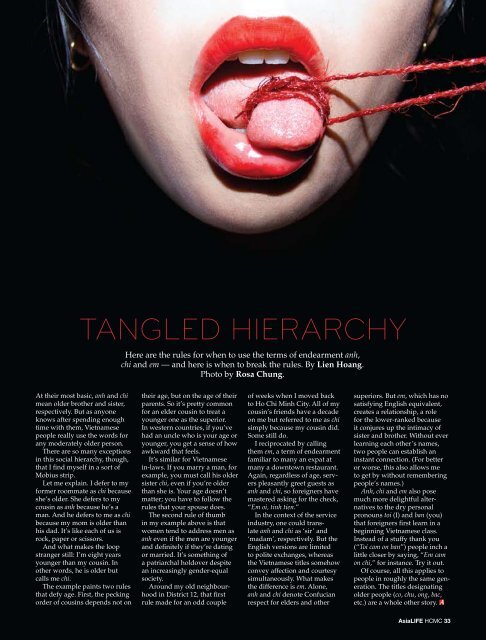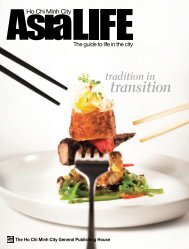issue 54 - AsiaLIFE Magazine
issue 54 - AsiaLIFE Magazine
issue 54 - AsiaLIFE Magazine
You also want an ePaper? Increase the reach of your titles
YUMPU automatically turns print PDFs into web optimized ePapers that Google loves.
Tangled Hierarchy<br />
Here are the rules for when to use the terms of endearment anh,<br />
chi and em — and here is when to break the rules. By Lien Hoang.<br />
Photo by Rosa Chung.<br />
At their most basic, anh and chi<br />
mean older brother and sister,<br />
respectively. But as anyone<br />
knows after spending enough<br />
time with them, Vietnamese<br />
people really use the words for<br />
any moderately older person.<br />
There are so many exceptions<br />
in this social hierarchy, though,<br />
that I find myself in a sort of<br />
Mobius strip.<br />
Let me explain. I defer to my<br />
former roommate as chi because<br />
she’s older. She defers to my<br />
cousin as anh because he’s a<br />
man. And he defers to me as chi<br />
because my mom is older than<br />
his dad. It’s like each of us is<br />
rock, paper or scissors.<br />
And what makes the loop<br />
stranger still: I’m eight years<br />
younger than my cousin. In<br />
other words, he is older but<br />
calls me chi.<br />
The example paints two rules<br />
that defy age. First, the pecking<br />
order of cousins depends not on<br />
their age, but on the age of their<br />
parents. So it’s pretty common<br />
for an elder cousin to treat a<br />
younger one as the superior.<br />
In western countries, if you’ve<br />
had an uncle who is your age or<br />
younger, you get a sense of how<br />
awkward that feels.<br />
It’s similar for Vietnamese<br />
in-laws. If you marry a man, for<br />
example, you must call his older<br />
sister chi, even if you’re older<br />
than she is. Your age doesn’t<br />
matter; you have to follow the<br />
rules that your spouse does.<br />
The second rule of thumb<br />
in my example above is that<br />
women tend to address men as<br />
anh even if the men are younger<br />
and definitely if they’re dating<br />
or married. It’s something of<br />
a patriarchal holdover despite<br />
an increasingly gender-equal<br />
society.<br />
Around my old neighbourhood<br />
in District 12, that first<br />
rule made for an odd couple<br />
of weeks when I moved back<br />
to Ho Chi Minh City. All of my<br />
cousin’s friends have a decade<br />
on me but referred to me as chi<br />
simply because my cousin did.<br />
Some still do.<br />
I reciprocated by calling<br />
them em, a term of endearment<br />
familiar to many an expat at<br />
many a downtown restaurant.<br />
Again, regardless of age, servers<br />
pleasantly greet guests as<br />
anh and chi, so foreigners have<br />
mastered asking for the check,<br />
“Em oi, tinh tien.”<br />
In the context of the service<br />
industry, one could translate<br />
anh and chi as ‘sir’ and<br />
‘madam’, respectively. But the<br />
English versions are limited<br />
to polite exchanges, whereas<br />
the Vietnamese titles somehow<br />
convey affection and courtesy<br />
simultaneously. What makes<br />
the difference is em. Alone,<br />
anh and chi denote Confucian<br />
respect for elders and other<br />
superiors. But em, which has no<br />
satisfying English equivalent,<br />
creates a relationship, a role<br />
for the lower-ranked because<br />
it conjures up the intimacy of<br />
sister and brother. Without ever<br />
learning each other’s names,<br />
two people can establish an<br />
instant connection. (For better<br />
or worse, this also allows me<br />
to get by without remembering<br />
people’s names.)<br />
Anh, chi and em also pose<br />
much more delightful alternatives<br />
to the dry personal<br />
pronouns toi (I) and ban (you)<br />
that foreigners first learn in a<br />
beginning Vietnamese class.<br />
Instead of a stuffy thank you<br />
(“Toi cam on ban”) people inch a<br />
little closer by saying, “Em cam<br />
on chi,” for instance. Try it out.<br />
Of course, all this applies to<br />
people in roughly the same generation.<br />
The titles designating<br />
older people (co, chu, ong, bac,<br />
etc.) are a whole other story.<br />
asialife HCMC 33















